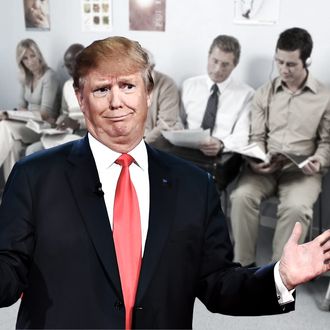
The general consensus from Thursday night’s CNN/Telemundo debate is that Marco Rubio “trapped” Donald Trump into a discussion of health policy that exposed Trump’s embarrassing lack of knowledge and sketchy plans. (Ted Cruz went after Trump for his past support for a single-payer system, which is another issue entirely.) In fact, most of the commentary afterward was not about what Trump actually proposes to do in the way of a repeal-and-replace-Obamacare scheme but devoted to Rubio’s turning-the-tables mockery of the mogul for robotically repeating lines (lines about “state lines,” as it happens) instead of answering questions.
To the extent observers looked deeper than this stylistic gotcha, they generally agreed that Trump wasn’t offering anything like a real health-care plan, particularly as compared to Rubio’s complicated and problematic but word-heavy scheme involving tax credits and HSAs and other conservative health-policy pet rocks. But his impulses, focused on the kind of people the Affordable Care Act was intended to help, are perhaps what really bugs conservatives.
Although Trump’s health-care policy word salad was mixed up enough to leave a lot of questions, he mentioned three concerns often enough to suggest that they were big priorities for him: interstate insurance competition, people who are uninsurable because of preexisting conditions, and some kind of catastrophic care for people who cannot afford coverage. The first idea, however inelegantly Trump explained it, is common to virtually all GOP schemes. The second, however, is the main objection to the first: If you let insurance companies sell policies nationally, they will migrate to the states with the least regulation, particularly with respect to preexisting-condition exclusions and the “community rating” practices that spread the overall cost of insurance from sick to healthy people. You can, however, make these impulses compatible by preempting state insurance regulation altogether with federal regulations that protect people with preexisting conditions and provide other safeguards we now leave to the states. That is, in effect, what Obamacare does, and if you look at the polling on the subject, it would not be at all surprising to see Trump decide that’s one aspect of the ACA he wouldn’t mess with, or would reinstitute after ritualistically repealing the whole thing.
Other Republicans claim they care about people with preexisting conditions as well, but as far as I know, none of them have considered banning discrimination by insurance companies by federal regulation. No, Rubio and others rely on one of those conservative-policy pet rocks instead: a subsidized “high-risk pool” that segregates people the insurance companies don’t want to cover and offers them very limited and very expensive policies that are better than nothing only if you can afford to buy them.
Trump also talks a lot about some national policy that will guarantee no one “dies on the street.” It’s not clear what he’s talking about. But given that other Republicans almost invariably propose to turn Medicaid into block grants to the states, letting them do whatever the hell they want, then perhaps Trump is hanging on to some notion that the federal government has the ultimate responsibility to make sure there remains some safety net that’s available everywhere.
Maybe I’m being too charitable to Trump, and either he has no idea what to propose or if pressed will wind up with the same ideas as his GOP rivals. But until that’s clear, I don’t think these rivals have much standing to mock him. Lord knows he could hardly do worse than Marco Rubio in covering the uninsured or protecting the destitute.






























